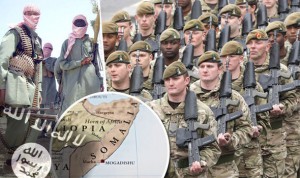A British Army team has arrived in Somalia as part of a UN-backed African Union Mission in Somalia (AMISOM) to counter Islamist militants.The move reinforces the UK’s commitment to targeting terrorism around the world.
AMISOM was launched in 2007 to fight against Al-Shebab – the Islamist militant group allied to al-Qaeda – whichi is still battling Somalia’s government for control of the country.
One of the reasons they exert control is because armed forces on the ground do not have the means to take them on.
“The real threat of al-Shebab in Somalia is the lack of security provided in the countryside. They’re allowed to operate very freely on the countryside, there’s little local security, and the Somali securtity forces do not function properly,” Stig Jarle Hansen, an international relations professor at the Norwegian University and al-Shabab specialist, told RFI.
“One of the reasons is the lack of funding. Policemen in charge of counter-terrorism operations and the army don’t receive more than 100$ a month. Basically, the Somali security structure is not properly functionning. Which means that AMISOM doesn’t have a proper local partner. It also means that al-Shebab has full freedom of operations, even behind the lines of AMISOM. In the countryside, they can do whatever they want: amass forces, do forced recruitment and collect taxes.”
The UK is sending military personnel to help AMISOM, but it’s a small contigent to start with.
“It’s just an advanced party at the moment of about ten soldiers that have been sent to Somalia, and that’s the forst part of a deployment of about 70 personnel who will be sent to the country. And the full deployment of the 70 troops will not actually be involved in frontline combat, but carrying out training, medical, logistical and engineering duties,” Cathy Haenlein, a security and political analyst at the Royal United Services Institute in London, told RFI.
“They’ll be supporting AMISOM, who’s been fighting against al-Shebab since 2007 and we have to remember that it’s a relatively small number of troops. It will certainly be a welcome deployment given that AMISOM, the African Union mission in Somalia is lacking in terms of capabilities. And given the range of challenges AMISOM troops are facing, it’s unlikely this will lead to a change in the course of the conflict itself.”
She says this move shows the UK is determined to tackle terrorism, not only at home, but anywhere in the world.
Obviously, it’s not going to make a huge difference in Somalia. But as soldiers there needed training, it will be welcome move.
“The Somali national army lacks training and therefore needs a backing, needs capacity building and therefore those British officers sent under the UN flag could deliver something important for the Somali national army,” Roland Marchal, from the National Centre of political studies in Paris, told RFI.
“On the other hand, you could say that this is just going to increase the chaos in the way the international community organises its own support of the Somali army. The real issue is actually how to organise, coordinate and make coherent, the behaviour, or the policy of a number of international donours who want to have their input in the somalian national army, and now, with an additional one, it’s not going to solve the problem.”
Marchal said that the Somali army also lacks organisation, it’s crippled by corruption. AMISOM itself also has to face problems including cultural differences among troops coming from several countries – such as the rivalries between Uganda, Kenya and Ethiopia
What all analysts agree on though is the fact that AMISOM clearly lacks funding.In January 2016, the European Union cut its funding by 20 percent and soldiers said they wouldn’t fight if they were not getting properly paid.
rfi.fr



